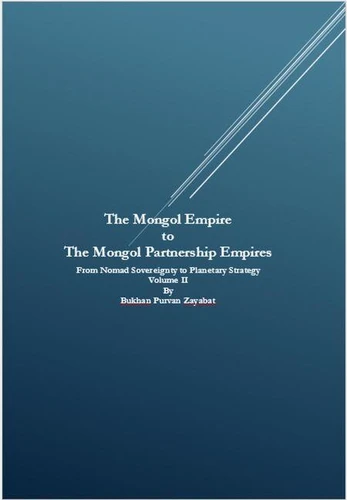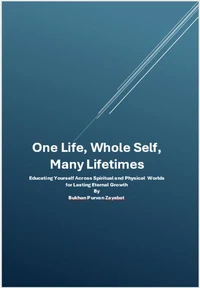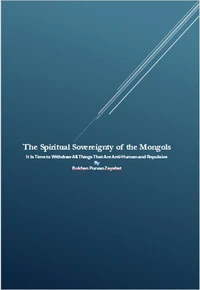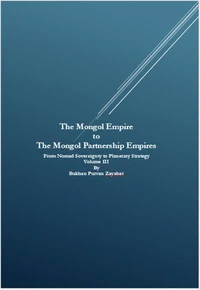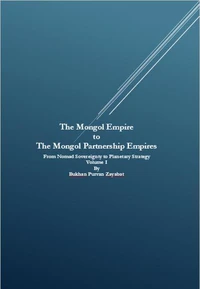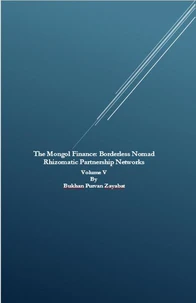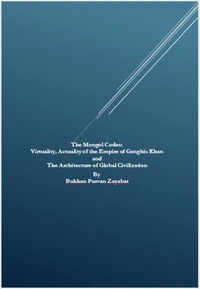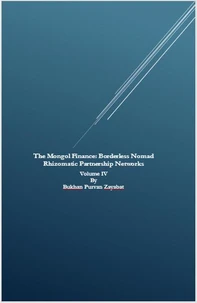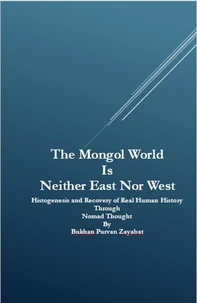The Mongol Empire to The Mongol Partnership Empires: From Nomad Sovereignty to Planetary Civilization Volume II
Par :Formats :
Disponible dans votre compte client Decitre ou Furet du Nord dès validation de votre commande. Le format ePub est :
- Compatible avec une lecture sur My Vivlio (smartphone, tablette, ordinateur)
- Compatible avec une lecture sur liseuses Vivlio
- Pour les liseuses autres que Vivlio, vous devez utiliser le logiciel Adobe Digital Edition. Non compatible avec la lecture sur les liseuses Kindle, Remarkable et Sony
 , qui est-ce ?
, qui est-ce ?Notre partenaire de plateforme de lecture numérique où vous retrouverez l'ensemble de vos ebooks gratuitement
Pour en savoir plus sur nos ebooks, consultez notre aide en ligne ici
- FormatePub
- ISBN8231649501
- EAN9798231649501
- Date de parution24/07/2025
- Protection num.pas de protection
- Infos supplémentairesepub
- ÉditeurWalzone Press
Résumé
The Mongol Empire to The Mongol Partnership Empires: From Nomad Sovereignty to Planetary Civilization Volume IIThis volume presents a radical reappraisal of the Mongol Empire-not as a project of conquest alone, but as a planetary civilizational experiment rooted in spiritual cosmology, decentralized governance, and rhizomatic strategy. Drawing from nomadic epistemologies, Tengiriist metaphysics, and Deleuzian political thought, it reframes Mongol statecraft as an emergent model of non-sedentary power.
Far from a centralized monolith, the Mongol world system operated through polycentric coordination, trust-based economic partnerships (Ortoq capitalism), and intelligence infrastructures like the Yam relay. Its spiritual core-Tengirilig, the belief in the divine nature of all beings-produced governance structures based on ethical equality, fluid autonomy, and moral responsibility to cosmic balance.
The book investigates core concepts such as Tegshidegekh (smoothing) and Tuvshidegekh (leveling) as alternatives to hierarchical law, offering insight into early post-statist models of regulation. The fragmentation of the empire is shown not as decline, but as rhizomatic fertility-a generative logic of decentralization and resprouting. Essential reading for those seeking historical precedents for pluralistic governance, intercivilizational strategy, and cosmopolitical ethics in the Anthropocene.
Far from a centralized monolith, the Mongol world system operated through polycentric coordination, trust-based economic partnerships (Ortoq capitalism), and intelligence infrastructures like the Yam relay. Its spiritual core-Tengirilig, the belief in the divine nature of all beings-produced governance structures based on ethical equality, fluid autonomy, and moral responsibility to cosmic balance.
The book investigates core concepts such as Tegshidegekh (smoothing) and Tuvshidegekh (leveling) as alternatives to hierarchical law, offering insight into early post-statist models of regulation. The fragmentation of the empire is shown not as decline, but as rhizomatic fertility-a generative logic of decentralization and resprouting. Essential reading for those seeking historical precedents for pluralistic governance, intercivilizational strategy, and cosmopolitical ethics in the Anthropocene.
The Mongol Empire to The Mongol Partnership Empires: From Nomad Sovereignty to Planetary Civilization Volume IIThis volume presents a radical reappraisal of the Mongol Empire-not as a project of conquest alone, but as a planetary civilizational experiment rooted in spiritual cosmology, decentralized governance, and rhizomatic strategy. Drawing from nomadic epistemologies, Tengiriist metaphysics, and Deleuzian political thought, it reframes Mongol statecraft as an emergent model of non-sedentary power.
Far from a centralized monolith, the Mongol world system operated through polycentric coordination, trust-based economic partnerships (Ortoq capitalism), and intelligence infrastructures like the Yam relay. Its spiritual core-Tengirilig, the belief in the divine nature of all beings-produced governance structures based on ethical equality, fluid autonomy, and moral responsibility to cosmic balance.
The book investigates core concepts such as Tegshidegekh (smoothing) and Tuvshidegekh (leveling) as alternatives to hierarchical law, offering insight into early post-statist models of regulation. The fragmentation of the empire is shown not as decline, but as rhizomatic fertility-a generative logic of decentralization and resprouting. Essential reading for those seeking historical precedents for pluralistic governance, intercivilizational strategy, and cosmopolitical ethics in the Anthropocene.
Far from a centralized monolith, the Mongol world system operated through polycentric coordination, trust-based economic partnerships (Ortoq capitalism), and intelligence infrastructures like the Yam relay. Its spiritual core-Tengirilig, the belief in the divine nature of all beings-produced governance structures based on ethical equality, fluid autonomy, and moral responsibility to cosmic balance.
The book investigates core concepts such as Tegshidegekh (smoothing) and Tuvshidegekh (leveling) as alternatives to hierarchical law, offering insight into early post-statist models of regulation. The fragmentation of the empire is shown not as decline, but as rhizomatic fertility-a generative logic of decentralization and resprouting. Essential reading for those seeking historical precedents for pluralistic governance, intercivilizational strategy, and cosmopolitical ethics in the Anthropocene.

